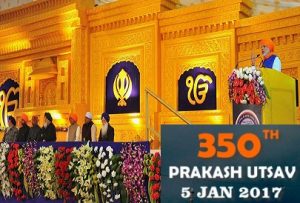The 350th Guru Gobind Singh Jayanti was celebrated across the world on January 5, 2017.Marking the occasion, a huge festival known as Prakash Utsav also known as Prakash Parv has been organized in Patna, Bihar– the birth place of the Guru.
The festival which is celebrated every year in Patna is attended by nearly 5 lakh devotees each year. The festival has been organized at the city’s iconic, sprawling Gandhi Maidan.
- Prime Minister Narendra Modi attended the Prakash Utsav, which marks the 350th birth anniversary of Guru Gobind Singh. He reached Patna on January 5 where he was received by Governor Ramnath Kovind and Chief Minister Nitish Kumar. PM Modi offered prayers and served “langar” at the 61-acre area, covered with glittering tents.
- The Bihar government announced a three-day holiday for the event at Takht Harmandir Sahib from January 3 to January 5, 2017.
- A makeshift Gurudwara has been set up at Gandhi Maidan. The Holy Gurugranth Sahib has been installed in view of Prakash Parv celebrations.

- The ceremony was also attended by Punjab Chief Minister Parkash Singh Badal, ministers and other dignitaries from the state. A large number of Sikhs from India and abroad are participating in the week-long festival.
Commemorative Postage stamp
Prime Minister Modi released a commemorative postage stamp to mark the occasion of 350th birth anniversary of Guru Gobind Singh.
Committee Formed for the Celebration
Punjab Chief Minister Parkash Singh Badal held a detailed discussions regarding the celebrations of the mega event with Shiromani Akali Dal President and Punjab Deputy Chief Minister Sukhbir Singh Badal, president of the Shiromani Gurdwara Prabandhak Committee (SGPC) Avtar Singh and the president of the Delhi Sikh Gurdwara Management Committee (DSGMC) Manjit Singh G.K.
- After the meeting a high-powered committee was constituted under the chairmanship of Punjab chief minister, with Deputy chief minister, president SGPC, and president DSGMC, besides eminent Sikh scholars and intellectuals as its members to work out the modalities for the commemoration of this historic occasion with religious fervour, enthusiasm and devotion.
- The Bihar chief minister told that nearly 75 acres of land had already been identified in Patna for the setting up of a ‘tented city’ for the celebrations in view of the expected massive participation of Sikhs from not only different parts of the country but from across the world.
Fund Allocation
The Government at Municipal, Provincial and Federal level has contributed the funds for the events and the new infrastructure planned for the celebrations.
- NRIs and businessmen from across world has contributed Rs. 600 crore (US$89 million) to develop Harmandir Saheb.
- Union Finance Ministry allocated a package of Rs. 100 crore (US$15 million) for the celebrations.
- The Bihar government has spent Rs. 100 crore (US$15 million) on the arrangements and the celebrations.
About Guru Gobind Singh
Guru Gobind Singh, the 10th Sikh Guru, was born as Gobind Rai in Patna on December 22, 1666. He was a spiritual master, warrior, poet and philosopher. Gobind Singh was the only son of Guru Tegh Bahadur, the ninth Sikh guru, and Mata Gujri.
- He was born in Patna (Bihar) while his father was visiting Bengal and Assam. His birth name was Gobind Rai, and a shrine named Takht Sri Patna Harimandar Sahib marks the site of the house where he was born and spent the first four years of his life.
- He was anointed as the spiritual leader of the Sikhs at the mere age of nine and is the tenth Sikh Guru. He was the last of the living Sikh Gurus. His four sons died during his lifetime in Mughal-Sikh wars, two in battle, two executed by the Mughal army.
Guru Gobind Singh is known to have initiated the five ‘K’s that the Sikhs devotedly abide by. These include:
- Kesh: uncut hair
- Kangha: a wooden comb
- Kara: an iron or steel bracelet worn on the wrist
- Kirpan: a sword
- Kacchera: short breeches